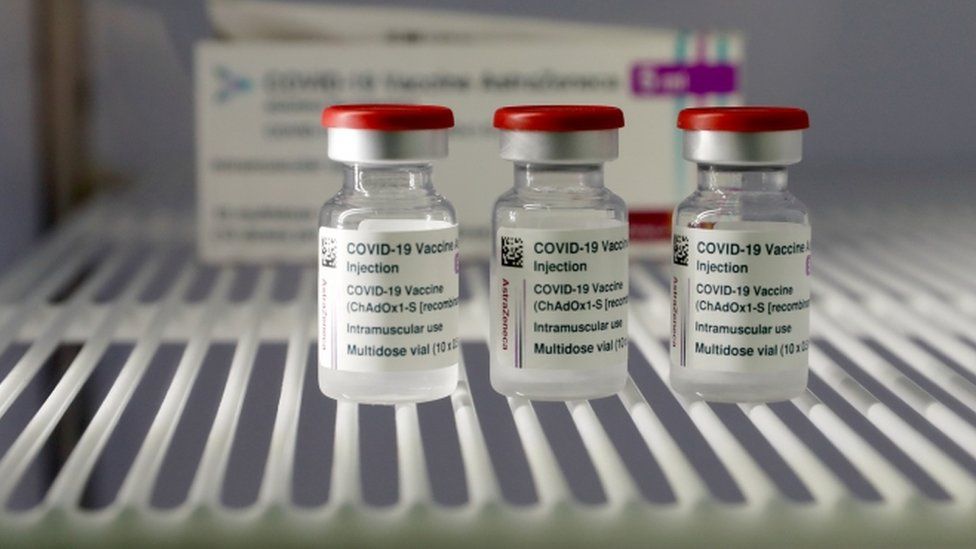Covid-19: Australia asks European Commission to review Italy's vaccine block
- Published

Australia has asked the European Commission to review Italy's decision to block the export of 250,000 doses of the AstraZeneca vaccine to the country.
It is the first time new rules have been used that allow a ban on EU exports if the drug provider fails to meet its obligations to the bloc.
The move has heightened a tense dispute between AstraZeneca and EU countries over supply issues and delays.
Australia said losing "one shipment" would not badly affect its rollout.
Prime Minister Scott Morrison said while he had requested the review, he could also understand why Italy made the decision.
"In Italy, people are dying at the rate of 300 a day. And so I can certainly understand the high level of anxiety that would exist in Italy and in many countries across Europe," he said.
Italy has been hit badly by the pandemic, and its decision to block the exports has reportedly been backed by the European Commission.
The country has registered more than 2.9m cases and nearly 99,000 deaths. Australia, on the other hand, has reported just over 29,000 cases and 900 deaths.
Australia's Finance Minister Simon Birmingham told Sky News: "The world is in unchartered territory at present - it's unsurprising that some countries would tear up the rule book."
The president of the Australian Medical Association, Dr Omar Khorshid, told the BBC "it was disappointing to see this vaccine nationalism rearing its head".
Dr Omar Khorshid told the BBC "It was disappointing to see this vaccine nationalism rearing its head"
There has been no official comment on the Italian move by the EU or AstraZeneca.
What does Italy say?
Last week, the Italian government told the European Commission it intended to block the shipment from its plant in Anagni, near Rome.
In a statement on Thursday, the foreign ministry explained the move, saying it had received the request for authorisation on 24 February.
It said that previous requests had been given the green light as they included limited numbers of samples for scientific research, but the latest one - being much larger - was rejected.
Italy said Australia was not on a list of "vulnerable" countries, that there was a permanent shortage of vaccines in the EU and Italy, and that the number of doses was high compared to the amount given to Italy and to the EU as a whole.
What about the rest of the EU?
France's Health Minister, Olivier Véran, has told BFM TV France could potentially do the same thing with the vaccines being made there.
Jens Spahn, Germany's health minister, has said drug makers must honour their contracts to EU countries, but has not seen any reason to block shipments to other countries so far. AstraZeneca is not produced in Germany, but some of the final product is bottled there.
EU media was fast to comment on the move.
Italy's Corriere della Sera said the move was decided together with Europe and motivated by the "plight of the desperate".
"Australia is angry with Italy's vaccine blockade," said Germany's Frankfurter Allgemeine Zeitung.
"The relations between the European Commission and the Anglo-Swedish pharmaceutical company AstraZeneca could not be thornier," Spain's ABC daily said.
In Poland, the Onet.pl news portal said the European Commission could have overruled Italy's export ban, "but it did not dare do so".
Why is there a row with AstraZeneca?
The EU signed a deal with AstraZeneca in August for 300 million doses, with an option for 100 million more, but earlier this year the UK-Swedish company reported production delays at plants in the Netherlands and Belgium.
Instead of receiving 100 million doses by the end of March, the EU is now expected to get just 40 million.
The EU accused the company of reneging on its deal, with EU Health Commissioner Stella Kyriakides saying that UK factories making the vaccine should make up the shortfall.
Ms Kyriakides also rejected AstraZeneca CEO Pascal Soriot's characterisation of the contract as one of "best effort" rather than an obligation to meet a deadline for delivery of vaccines.
As a result of the row, the EU announced export controls which began on 30 January, known as the "transparency and authorisation mechanism".
Italy has become the first EU country to call on the guidelines and block the Australian shipment.
What's the latest with Australia's vaccine rollout?
People have started to be vaccinated, with the prime minister receiving his first jab - which was the Pfizer vaccine - in late February.
Scott Morrison hopes four million Australians will have been vaccinated by the end of March.
Australia has a contract with AstraZeneca to receive 53.8m doses of the vaccine. About 3.8m of those will be imported from overseas.
It has already been sent 300,000 doses, which the government says will last until late March, when it will begin making its own AstraZeneca vaccines domestically.
- Published27 January 2021
- Published26 January 2021